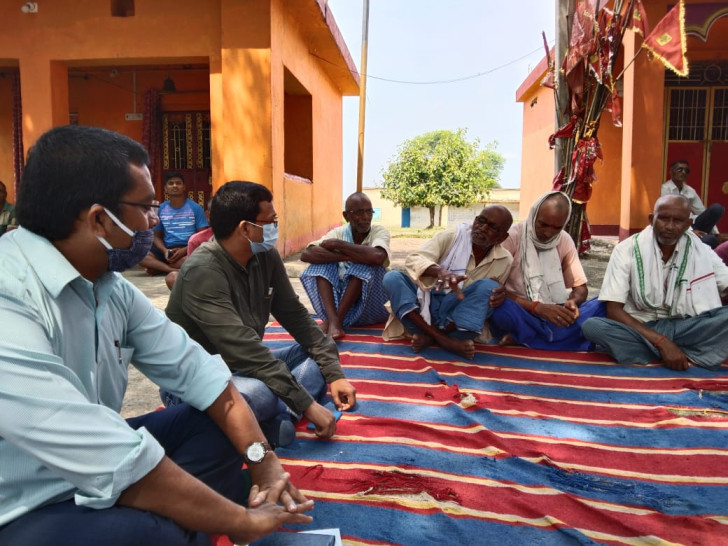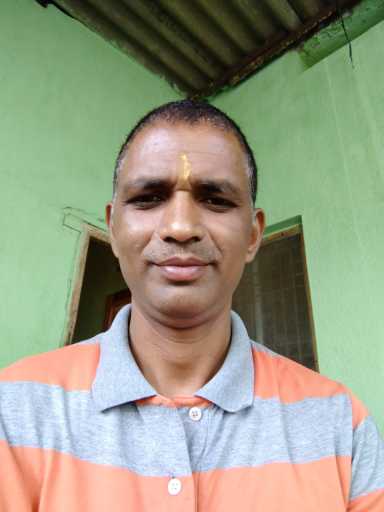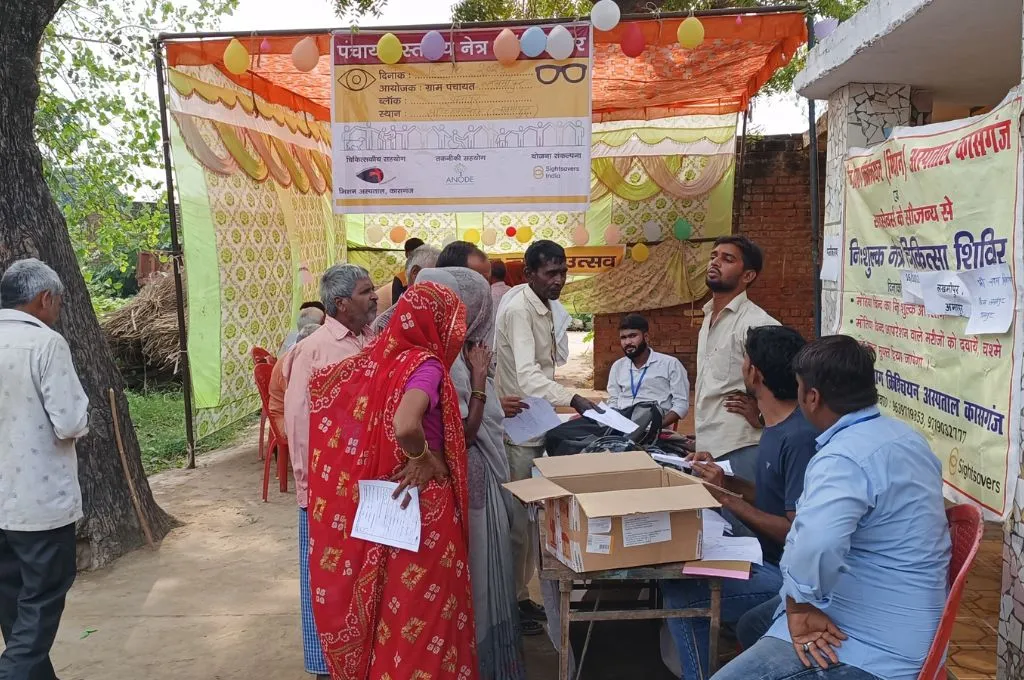My name is Kamakhya Kumar Singh and I am from Bardewa, a village in the district of Hazaribagh in Jharkhand. In 2015, I contested elections for the post of mukhiya, or head, of Pindarkon gram panchayat. I won the elections by 74 votes and started this new role in January 2016.
I hadn’t originally planned to work in the panchayat. My interest was in social work. In Jharkhand, panchayat elections were held for the first time ever in 2010. During the first term of Panchayati Raj in Jharkhand, I was working in rural areas, promoting agri-based livelihoods, with organisations such as PRADAN and the Jharkhand State Livelihood Promotion Society. While I was engaged in this, I realised that the Panchayati Raj system was very weak in Jharkhand. People did not really understand what Panchayati Raj—or local self-governance—meant nor know much about the role of the gram panchayat. Gram sabha and panchayat meetings were not held regularly, and many rules and regulations were not being followed. When people needed help from the gram panchayat they simply went to the mukhiya’s house to get their work done.
I then spent some time studying the Panchayati Raj Institution (PRI) regulations in Jharkhand. As I did, it dawned on me that if I want to create change in this system, then I should become closely involved with it. This was why I decided to stand for panchayat elections in 2015.
In the first two years of my term, I spent a lot of my time bringing the ward members together and helping them understand their duties and responsibilities. We also held many meetings and discussions with the gram sabha—which comprises all adults who are registered voters—to help them understand the role of the panchayat and what it can do for people. Over time, gram sabha and panchayat meetings became more regular. We share all the outcomes of these meetings with the gram sabha. As people started having more access to information—such as the funds that are available to our panchayat and the status of projects—their trust in this system of local governance has increased.
9.30 AM: I reach the panchayat office and spend some time preparing for the day ahead. There are several meetings or baithaks scheduled today, all of which are going to be held at the panchayat office. In normal circumstances I spend a few days every week attending baithaks in the other villages that fall within our panchayat area. Nowadays we only organise a baithak if it is absolutely necessary.
One of the standing committees of our panchayat—the development committee is going to have a meeting in a few hours. Every panchayat has several standing committees that are responsible for issues such as education, health, agriculture, and overall development of the area for which the panchayat is responsible. During the pandemic, our development committee, or vikas samiti has been very active. It is this committee that has been responsible for generating work for migrants who have returned home due to the pandemic.
We had to immediately think about how to keep them and the other villagers safe from any risk of infection.
A few weeks after the first lockdown was announced, people from our panchayat who had migrated in search of employment started returning to their villages. Some returned on foot, others on cycles—all of them faced much difficulty in reaching home. We had to immediately think about how to keep them and the other villagers safe from any risk of infection. And so, we converted our panchayat office into a quarantine centre for people who were returning from red zones—areas with high numbers of cases. We also converted our health centre into a quarantine centre for people who were returning from yellow and green zones—places with few or no COVID-19 cases.

During the pandemic, our development committee, or vikas samiti has been very active. | Picture courtesy: Kamakhya Kumar Singh
We were able to access some remaining funds from the 14th Finance Commission funds to maintain these centres and provide soap, sanitiser, and masks to the returning migrants. However, we could not provide them with meals and these were being delivered to them by their families. This system worked initially, but we soon had to open more quarantine centres, as our panchayat comprises of seven villages, some of which are nearly 12 km away from the panchayat office and health centre. People from these villages could not deliver food to their family members regularly, and so, we converted government schools in these villages into quarantine centres.
Many people who returned had no source of income or savings, so we provided dry rations to more than 200 families who were in need. But this is not a permanent solution to help them cope with the situation. So we started generating work through Mahatma Gandhi National Rural Employment Guarantee Act (NREGA) to provide those that were in need with some income. We have been able to engage more than 250 people in NREGA since the pandemic began.
11.30 AM: The vikas samiti meeting begins. One of the main discussion points for this meeting is to review the status of various NREGA projects or yojanas, and enlist workers in new yojanas.
We have identified a need to build soak pits in some villages. One of the samiti members has prepared a list of people that have returned to the village and are still looking for work. As we go through this list of people, we take note of their skills and experience to understand what kind of work they can do. While some people are unskilled and have been working as labourers, there are many who are skilled. They have been working as masons, carpenters, drivers, and plumbers. We will need both skilled and unskilled labour for the construction of soak pits, and so we go through the list and identify the people who have not had any income since they returned to Pindarkon.
We are not sure if people will be willing to leave their homes again.
Overall, it has not been too difficult to generate work for unskilled labourers. However, we don’t have many opportunities for skilled workers such as drivers or plumbers in Pindarkon. We are trying to find employment for them too. During the meeting, we discuss an ongoing conversation that we are having with a company that matches skilled labour to job opportunities at various companies. While the company representatives are confident that they will be able to match workers from Pindarkon to jobs, our concern is that these jobs are all in urban areas where the prevalence of COVID-19 is still high. We are not sure if people will be willing to leave their homes again. We are meeting some of the skilled labourers later to discuss whether they are open to this option.
2 PM: After we have taken a break for lunch, some of the skilled workers from our panchayat who are seeking employment join the vikas samiti meeting. We discuss the proposal from the company with them, giving them information about the kinds of jobs that are available and the wages that they will receive. However, when we tell them that the jobs are in states such as Rajasthan and Maharashtra, they tell us that they are not ready to migrate to these places due to the high rates of infection in those towns and cities. These are uncertain and difficult times and people prefer to be close to their families.
This means that we will have to continue looking for ways to generate income for these households.
3.30 PM: I receive a call from a gram sabha member who is involved in a land dispute with his brother. We try to manage these disputes at the local level itself, so that these cases don’t have to be escalated to the police or the courts. That is usually a more expensive and time-consuming route to conflict resolution. I typically spend 30 percent of my time resolving such disputes. I tell the person who has called that I will visit his village later in the week, along with the ward member for his area. He assures me that all the adults in the family will be present to participate in the discussion when we visit.
While we are spending more time solving issues that have emerged due to the pandemic these days, we cannot ignore our other responsibilities either.
4.30 PM: We are in the midst of setting up a Wi-Fi connection in our panchayat office and I go through the paperwork that is required for this. Earlier this year, the government launched eGramSwaraj, a virtual platform on which panchayats can upload their plans and budgets as well as receive approval for release of payments for implementation of plans. The implementation and payment system for other government schemes, such as NREGA, are also virtual and so it is important that we have the resources that we need to use these systems. There are many advantages to using these systems—if used properly then gram panchayats’ plans can be implemented more efficiently and transparently. But there has not been sufficient training and many mukhiyas and ward members are finding it challenging to use these new systems and softwares. As a temporary solution, the gram panchayats in our district are keeping all documents in hard copy as well.
6.30 PM: I return home to my family. I live in a joint family, along with both my brothers and their families. My immediate family comprises my wife, who is a school teacher, one daughter, and two sons. My daughter completed her 10th standard exams earlier this year and has been enrolled in the 11th standard. My older son is enrolled in a college in Ranchi and my younger son is enrolled in a cricket academy in Ranchi. However, they have all been at our home in Bardewa since the lockdown was announced. They have all enjoyed spending time together, and once in a while, I manage to take some time out to help them with their studies or play cricket.
As told to IDR.
—
Know more
- Explore the government’s India Panchayat Knowledge Portal—a one-stop repository for everything you need to know about rural local governance in India.
- Learn more about how democratic local governance and the Panchayati Raj Institutions work in practice, at PRIA’s Knowledge Resource Centre.





